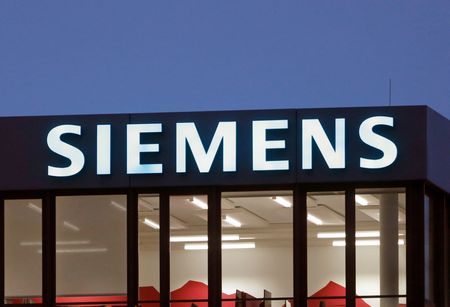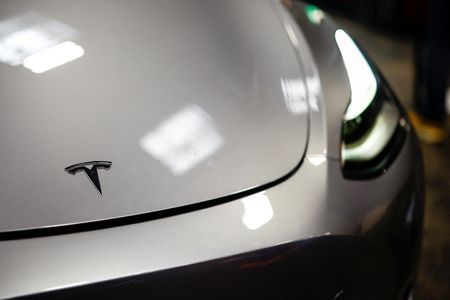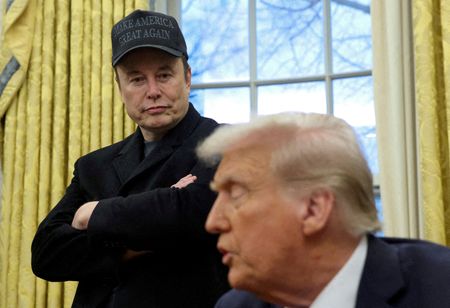By Nell Mackenzie
LONDON (Reuters) -Hedge funds have scaled back risky bets and sought safety, data from Goldman Sachs shows, ahead of this week’s widely anticipated announcement by U.S. President Donald Trump on reciprocal tariffs that has fuelled trade war fears.
Trump has for weeks flagged April 2 as a “Liberation Day” delivery date for his most ambitious actions yet to upend more than half a century of global trade norms, which saw barriers to international commerce fall, but in ways the president believes disadvantaged American goods and workers.
White House aides have drafted plans for tariffs of about 20% on most of the $3 trillion of goods imported annually to the U.S., the Washington Post reported on Tuesday.
Higher tariffs and lower earnings estimates are likely to shrink the S&P 500’s three-month returns by 5%, but U.S. markets should recover over the next year, a Goldman client note on Monday and seen by Reuters on Tuesday showed.
Here’s what Goldman Sachs prime brokerage says about hedge fund positioning. A prime brokerage desk lends money to hedge funds for trading and tracks their activities.
1/ RETREAT
Hedge funds have reduced their net exposure across all regions, especially in Europe, followed by emerging markets and Asia.
The amount traded on transparent and non-transparent stock exchanges trended lower in March, shows data from BMLL Technologies, bar a large options expiry on March 21. Such dates often see larger volumes traded as the derivatives that trade off their prices are closed.
2/ AVOID EMERGING MARKETS
Hedge funds have sold out of major emerging markets.
And so far this year, they have maintained more short than long positions in emerging market stocks in Latin America and Asia.
In Asia, stocks have been particularly sold in large amounts in March, Goldman Sachs data showed. A short position expects an asset price to decline, a long bet hopes it will rise.
3/ CYCLING OUT OF CYCLICALS
Hedge funds have cut their positions in stocks whose performance is closely tied to the economic cycle. These companies, like auto-parts manufacturers, some jewellery brands and home furnishing stores typically struggle when consumers have less money to spend.
That move coincides with increased concern that tariffs are raising U.S. recession risks.
4/ U-TURN
Hedge funds have starting selling European auto stocks, having snapped them up until early March, the Goldman data showed.
Speculators have piled into short positions on the sector since Trump last week made public a plan to implement a 25% tariff on imported cars and light trucks from April 3. A duty on auto parts begins on May 3.
The ratio of long positions compared to short bets against the auto sector are close to historic lows, said Goldman.
5/ METAL HEADS
Hedge funds have been net buyers in large amounts in recent weeks of company stocks that are sensitive to metals prices, said Goldman.
Hedge fund holdings in these names are at multi-year highs said the note. The note did not mention company names.
(Reporting by Nell Mackenzie; Editing by Dhara Ranasinghe and Barbara Lewis)









